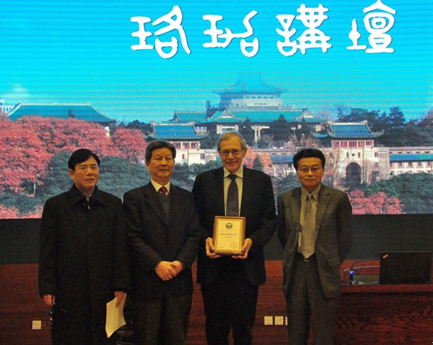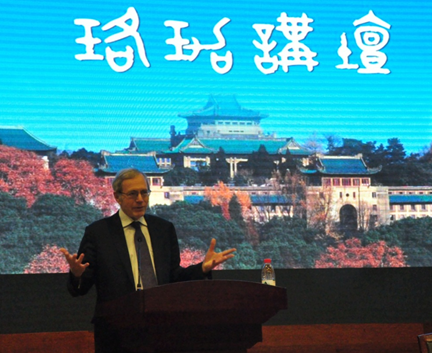On March 24th, the 167th LuoJia Lecture was held in the Old Library of the Cherry Castle.Prof. Eric Foner from Columbia University, delivered his speech on Abraham Lincoln and American politics. Senior professor of Humanities and Social Sciences, Prof. Hu Dekun awarded Prof. Foner, the Luojia Lecturer, with a commemorative certificate. Secretary of the History School Party Committee, Prof. Liu Litang, hosted the lecture and DeWitt Clinton, professor of History, delivered the introductory speech.

The LuoJia Lecturer awarding ceremony (from left, Prof. Liu Litang, Prof. Hu Dekun, Prof. Eric Foner and Prof. Wang Xi)
Prof. Foner pointed out that Abraham Lincoln was still reconstructing and rebuilding
the American political system even after his death, and finally the image of a “self-made man”, a “great emancipator” (the man who liberated the slaves) and the “American savior” was created. Abraham Lincoln is such a prominent figure in American history that every political group in the United States, from conservatives to communists, from civil right advocates to segregationists, claims to have descended from Lincoln ideals. He was more moderate than “abolitionists” and saw himself as part of a broader anti-slavery movement. He was an astute politician but was much more open-minded and welcomed difference in opinions. However, Prof. Foner also pointed out that there are differences between the real Abraham Lincoln and his glorified image. He said that Lincoln was not a “great emancipator” at first, who even wanted to get rid of the slaves by shipping them away. During his tenure as President, he made several economic reforms, built railroads and canals and enforced protective tariffs to encourage industry. But it is the emancipation proclamation and the end of the American Civil War that made him one of the greatest Presidents in American history.

Prof. Foner delivering his speech
Lincoln plays a particularly important role in the historical imagination of American people as a man who grew up in humble beginnings in the West and rose to a significant position. “There are thousands of books about Lincoln—so many that you could find almost any Lincoln you’d like in literature.” said Foner. “There is the Lincoln who is just this shrewd politician doing things to enhance his political career; there is the great emancipator Lincoln who always hated slavery and was determined to abolish it; there is this Lincoln who by modern standards does not measure up to our beliefs in racial equality and it seems like he even held racial prejudice as ideals.”
Then, Foner gave a brief introduction to Lincoln’s life and career. During early childhood, Lincoln’s parents moved from Kentucky, a state where slavery had not yet been abolished, to the free state Indiana. This might be a reason that inspired him to emerge as an advocate against slavery later in his life. Slavery violated the basic principles of equality,” continued Foner on the slavery issue, “liberty and the pursuit of happiness. To Lincoln, the pursuit of happiness meant the ability to improve one’s condition in life as he himself had done through his own labor. Slavery was a form of robbery, a theft—the stealing of someone’s labor by somebody else.” Foner believed that the institution of slavery can be attacked morally, religiously and politically, and Lincoln touched on all of them. When the head of the Republican warned Lincoln to rescind the proclamation if he wants to get reelected, he said, “I cannot do that. I do not want to go down in history as the man who promised freedom to people and then took away the promise. I would rather lose the election than be remembered in that way.”
Americans were trying to spread democracy but they faced a fundamental dilemma. Foner said, “Slavery undermined the American mission. How could the United States talk about spreading democracy, spreading freedom in the world when we have 4 million slaves in the United States?”
To solve the slavery problem, Lincoln had considered the idea of sending black populations away so they would not have to face injustice in America. “For Lincoln and many others, colonization was part of a plan to end slavery in a country where there were very big barriers in doing so—Legal barriers and constitutional barriers.” illustrated Foner. In spite of his former recognition of Lincoln’s achievements, he criticized Lincoln’s stance on racial equality in that Lincoln believed racism was just a fact instead of a crime like slavery.
Apart from his advocacy of ending slavery, Foner said that Lincoln also wished to entitle black people with the right to vote, to earn wages and to join the army. In his last speech, Lincoln for the first time publicly claimed that black people should have the right to vote, for they were very intelligent, brave and loyal. To treat black people as human beings instead of personal belongings was another factor that had been strongly emphasized by Lincoln, which means black people deserve their lawful right to earn reasonable wages.
The enlisting of black men into the army played an important role in eradicating the inequality. “By the end of war, 200,000 black men had served in the Union army and you do not put people into the army and have them fight and die for the nation and then tell them they have to get out of the country. In other words, being in the military and helping to win the war became the claim to equal citizenship in the United States once the war was over.” said Foner.
Talking about Lincoln blaming the war on American slavery, Foner said: “Lincoln understood that there had been 250 years of violent slavery before that and that’s part of what had caused the civil war.” In conclusion, he said, “Today 150 years after the end of the civil war, the ghosts of slavery is still haunting American society.”
As a leading contemporary historian of the post-Civil War Reconstruction period, Foner has published Reconstruction: America's Unfinished Revolution, 1863-1877 in 1989 which has won him the Bancroft Prize of that year and more than 10 other books on related topics. In 2011 Foner's The Fiery Trial: Abraham Lincoln and American Slavery (2010), which was recently translated into Chinese by commercial press and won many prizes including the Pulitzer Prize for History, the Lincoln Prize, and the Bancroft Prize. In 2000, he was elected president of the American Historical Association.
Photo by the Academy of Humanities and Social Sciences
Edited by Wu Siying, Edmund Wai Man Lai and Hu Sijia